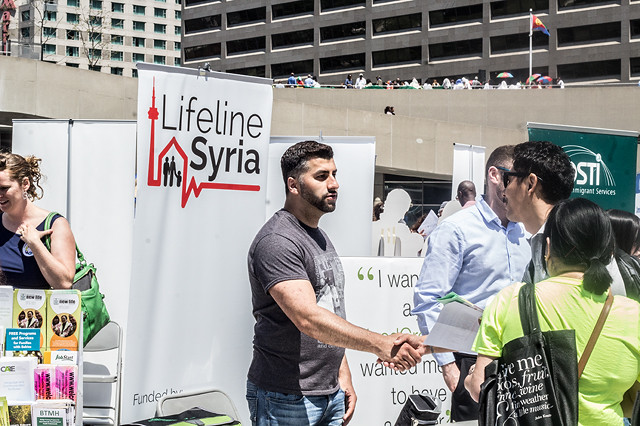Though the government is putting $875 million into the settlement services sector in 2021-2022 – over $100 million more compared to the previous year – to help support newcomers and refugees, critics still see limitations in the services, including lack of public education about their availability and lack of accessibility.
For instance, Immigration, Refugees and Citizenship Canada’s (IRCC) First Settlement Outcomes Report found that settlement services were crucial for new Canadians’ integration and success as they begin their lives in Canada. However, most newcomers remain unaware of these services, have difficulty accessing them or are ineligible for them. People with disabilities and those needing child care experienced the highest rates of unmet needs.
The report suggests that from 2015 to 2019, about 70 per cent of newcomers surveyed were unaware of the free settlement services available to them. Of those who had used some form of a service, over half did not know how to get the services they needed.
The Settlement Program is IRCC’s largest grant and contribution program, funding more than 500 service provider organizations (outside of Quebec). The program allows eligible newcomers to receive various services including learning an official language, finding a job, childcare, translation, interpretation, transportation and supports for disabled people.
Eligibility and Awareness
Yet, not everyone is eligible.
While permanent residents and protected persons qualify for settlement services, both before and after they arrive in Canada, foreign students, temporary foreign workers and refugee claimants (including children) do not.
Rupa Banerjee is the Canada Research Chair in Economic Inclusion, Employment and Entrepreneurship of Canada’s Immigrants. She said these big gaps in who is eligible for these services are limiting to many newcomers especially when they are in need.
But even for those who qualify, knowing about the services and how to use them can be a challenge in itself.
Newcomers require timely and accurate information to make informed settlement decisions and understand how to navigate life in Canada. Banerjee said, unfortunately, a lot of newcomers are left alone with the responsibility to find and access services.
According to Mohan Doss, director of newcomer and youth wellness programs at WoodGreen Community Services, for many newcomers, the “concept of settlement services itself” can be difficult to grasp. WoodGreen is one of the largest social service agencies in Toronto, serving 37,000 newcomers each year.
“(Settlement services) are not available in many of our main (immigrant-)source countries, like India, Pakistan, Sri Lanka, Bangladesh, China,” Doss says.
Needs and Assets Assessment and Referrals is one of the first points of contact between newcomers and service providers. This assessment is often the first step in their settlement journey and helps create a customized settlement plan for newcomers. Yet, only 23 per cent of all newcomers received the assessment in their landing year, according to IRCC’s report.
“Even though there is this effort to spread the word, it just doesn’t reach everybody. Sometimes it’s very hit-and-miss and just up to luck,” says Banerjee. “And that’s because newcomers are really in survival mode when they first arrive here. They’re simply looking to find a job skill that will pay the rent at that moment.”
Informal Networks
Ela Abade immigrated from Iran to Canada with her husband in February 2020. The two had studied civil engineering, but she said finding employment in Canada was a big challenge.
“My plan was to find a job related to my education, but it was hard because I didn’t have any Canadian experience,” she tells New Canadian Media.
With the help of her family, Abade reached out to a settlement service provider which helped her find a minimum wage job.
Like Abade, many newcomers use informal networks of friends and family to find information about and access settlement services.
“People do rely on their friends and family,” Banerjee said, “because they trust that source of information more than official channels, the government or settlement organizations. They trust the experiences of people they know.”
However, these networks can hold many new Canadians back. Although it may initially help them find support services, it can also mean newcomers receive incorrect information or get stuck in “ethnic enclaves,” Banerjee says.
“They get stuck in not really learning the official languages because they don’t see it as necessary because they’re getting all of their information and resources from people who speak the same languages,” she says. “And so, it kind of keeps us trapped in this bubble, which … after a period of time prevents them from integrating more.”
More Work Needed
While the IRCC describes success qualitatively, it funds based on the number of clients served.
Banerjee said because of this funding model, settlement services must try to service a larger proportion of clients in order to ensure more funding, which can mean that, sometimes, the service they provide may not necessarily be impactful or even personalized.
“Whether those touchpoints are meaningful, whether they’ve actually had an impact on (newcomers’) lives, is another question,” she said. “Given that limitation, (services can be) almost like checkboxes.”
Banerjee said services — specifically for those who are particularly vulnerable, like racialized women and disabled people — are there but “reach a fairly small proportion.”
IRCC has proposed $15 million over two years to extend the Racialized Newcomer Women Pilot, which will continue to improve employment outcomes and career advancement for racialized newcomer women.
Also proposed was a sum of $2 million over five years to increase access to information and support for new Canadians facing family and gender-based violence, including enhancing the availability of anti-violence resources.
Newcomers can reach out to a service provider organization in their area to find out how they can access settlement services here.




